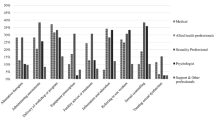Abstract
The training needs of rehabilitation professionals in the area of sexuality and sexual function, particularly following spinal cord injury (SCI) has received little attention in the literature. Specifically, there is negligible theoretical discussion related to staff training needs, as well as a paucity of standardised scales to measure these needs. A conceptual model was developed encompassing staff knowledge, comfort, and attitudes towards sexuality following SCI. Using this model, a scale was developed, evaluated, and refined. Factor analysis supported the construct validity of the scale in measuring the existing conceptual model outlined but highlighted the existence of a separate construct related to personal approaches from clients. The subsequently named Knowledge, Comfort, Approach and Attitudes towards Sexuality Scale (KCAASS) demonstrated high levels of internal consistency across the four conceptual domains. The KCAASS has utility for rehabilitation facilities interested in identifying and targeting training initiatives related to addressing client sexuality needs following SCI.
Similar content being viewed by others
REFERENCES
Hart KA, Rintala DH, Fuhrer MJ: Educational interests of individuals with spinal cord injury living in the community: Medical, sexuality, and wellness topics. Rehabil Nurs 21:82-90, 1996.
McAlonan S: Improving sexual rehabilitation services: The patient's perspective. Am J Occup Ther 50:826-34, 1996.
Summerville P, McKenna K: Sexuality education and counselling for individuals with a spinal cord injury: Implications for occupational therapy. Br J Occup Ther 61:275-279, 1998.
Creasey GH: Restoration of bladder, bowel, and sexual function. Top Spinal Cord Inj Rehabil 5:21-32, 1999.
Stiens SA, Bergman SB, Formal CS: Spinal cord injury rehabilitation: Individual experience, personal adaptation, and social perspectives. Arch Phys Med Rehabil 78:S65-S72, 1997.
Hodge AL: Addressing issues of sexuality with spinal cord injured persons. Orthop Nurs 14:21-24, 1995.
Killen JM: Role stabilization in families after spinal cord injury. Rehabil Nurs 15:19-21, 1990.
McColl MA, Skinner HA: Spinal cord injury and lifestyle health risks. Can J Rehabil 9:69-82, 1996.
Dunn M: Sexual questions and comments on a spinal cord injury service. Sex Disabil 6:126-134, 1983.
Herson L, Hart KA, Gordon MJ, Rintala DH: Identifying and overcoming barriers to providing sexuality information in the clinical setting. Rehabil Nurs 24:148-151, 1999.
Novak PP, Mitchell MM: Professional involvement in sexuality counseling for patients with spinal cord injuries. Am J Occup Ther 42:105-112, 1988.
Tepper MS: Providing comprehensive sexual health care in spinal cord injury rehabilitation: Implementation and evaluation of a new curriculum for healthcare professionals. Sex Disabil 15:131-165, 1997.
Drench ME, Losee RH: Sexuality and sexual capacities of elderly people. Rehabil Nurs 21:118-123, 1996.
Spica MM: Sexual counseling standards for the spinal cord injured. J Neurosci Nurs 21:56-60, 1989.
Tepper MS: Sexual education in spinal cord injury rehabilitation: Current trends and recommendations. Sex Disabil 10:15-31, 1992.
White MJ, Rintala DH, Hart KA, Young ME, Fuhrer MJ: Sexual activities, concerns and interests of men with spinal cord injury. Am J Phys Med Rehabil 71:225-231, 1992.
White MJ, Rintala DH, Hart KA, Fuhrer MJ: Sexual activities, concerns and interests of women with spinal cord injury living in the community. Am J Phys Med Rehabil 72:372-378, 1993.
Rose J, Holmes S: Changing staff attitudes to the sexuality of people with mental handicaps: An evaluative comparison of one and three day workshops. Ment Hand Res 4:67-79, 1991.
Scotti JR, Slack BS, Bowman RA, Morris TL: College student attitudes concerning the sexuality of persons with mental retardation: Development of the Perceptions of Sexuality Scale. Sex Disabil 14:249-263, 1996.
O'Sullivan V, Weerakoon P: inappropriate sexual behaviours of patients towards practising physiotherapists: a study using qualitative methods. Physiother Res Int 4:28-42, 1999.
Walsh J: Recognizing and managing boundary issues in case management. Care Manage J 2:79-85, 2000.
Williams J, Swartz M: Treatment boundaries in the case management relationship: A clinical case and discussion. Community Ment Health J 34:299-311, 1998.
Trieschmann RB: Spinal cord injuries: Psychological, social and vocational rehabilitation, 2nd Ed. New York, Demos, 1988.
Chivers J, Mathieson S: Training in sexuality and relationships: An Australian model. Sex Disabil 18:73-80, 2000.
Freer KJ, Turner R: Participatory workplace literacy training in a hospital setting. J Healthc Educ Train 9:1-6, 1995.
Author information
Authors and Affiliations
Corresponding author
Rights and permissions
About this article
Cite this article
Kendall, M., Booth, S., Fronek, P. et al. The Development of a Scale to Assess the Training Needs of Professionals in Providing Sexuality Rehabilitation Following Spinal Cord Injury. Sexuality and Disability 21, 49–64 (2003). https://doi.org/10.1023/A:1023510925729
Issue Date:
DOI: https://doi.org/10.1023/A:1023510925729




